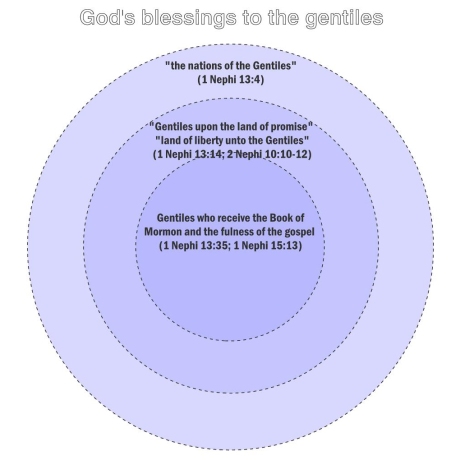When the Savior ministered to the Nephites, He said the Book of Mormon would come forth in the last days to try the Gentiles’ faith:
“And when they shall have received this, which is expedient that they should have first, to try their faith, and if it shall so be that they shall believe these things then shall the greater things be made manifest unto them. And if it so be that they will not believe these things, then shall the greater things be withheld from them, unto their condemnation” (3 Nephi 26:9-10).
Christ spelled out the conditions: if they believe these things, they will receive the greater (sealed) portion; if they do not, it will be withheld unto their condemnation. This resembles the pattern described by Alma concerning the mysteries of God; he who hardens not his heart will receive the greater portion until he knows the mysteries in full, but he who does harden his heart will receive a lesser portion until he knows nothing concerning his mysteries (Alma 12:9-11; D&C 50:24).
The principle is this: When God speaks, there is no longer middle ground. We must either repent and reconcile ourselves to His light and word, or come under condemnation for sinning against it. We will either move into greater light, or greater darkness.
An example of this in the scriptures is when the Lord invited Israel (in the wilderness) to come into His presence. They had an invitation to receive the “greater” blessings of the high priesthood, but “hardened their hearts and could not endure his presence,” and so the Lord took Moses and the Holy Priesthood out of their midst, and they were left with a “lesser” portion (D&C 84:23-26).
When Nephi was shown in vision the events of our day, he saw a short period of time when the gospel would go to the Gentiles in the last days. At “that day,” the angel told Nephi, the Gentiles would either harden their hearts against His word, or they would not (1 Nephi 14). This is the question on heaven’s mind in our day. Will we harden our hearts, like the children of Israel before? Or will we receive the word of God with gladness?
In 1832, only two years after the Gentiles had received the Book of Mormon, the Lord told the Church they had come under condemnation for “vanity and unbelief,” because they had treated lightly the things they had received (most notably the Book of Mormon). He declared that this condemnation would remain until they “repent and remember the new covenant, even the Book of Mormon and the former commandments which I have given them, not only to say, but to do according to that which I have written” (D&C 84:54-58).
This condemnation remains for as long as we continue to harden our hearts. If we repent and remember the Book of Mormon individually, greater things will be made manifest to us. When the Gentiles come together “that they shall repent of their iniquity, and become clean before the Lord,” the Lord will reveal the sealed portion (Ether 4:6-7).
Though most people understand the sealed portion will not come forth until we make full use of the Book of Mormon, some may still be surprised at the idea of condemnation. However, the two ideas go hand-in-hand, as the scriptures indicate.
This sobering truth ought to give us pause and cause us to wonder, “In what ways have I hardened my heart against the Lord’s words in the Book of Mormon? How can I repent and receive more of what He wants to give me?”
The answer to this question will largely be personal because repentance is an individual matter. However, there is one thing that I believe applies almost universally that adds to our condemnation, resulting in our minds being darkened.
The Savior’s Commandment

When Jesus ministered to the Nephites following His resurrection, He gave us the following commandment regarding the prophecies of Isaiah: “And now, behold, I say unto you, that ye ought to search these things. Yea, a commandment I give unto you that ye search these things diligently; for great are the words of Isaiah” (3 Nephi 23:1).
Isaiah is the only book of scripture we’ve been directly commanded to study by Christ Himself, and unfortunately, it is the only one we make fun of.
We joke in quasi-hushed tones about “the Isaiah chapters” in the Book of Mormon, or talk about how we normally skip them, or don’t get much of out of them. There’s of course the joke of the soldier who was shot, but the bullet stopped in about 2 Nephi of his pocket Book of Mormon; “nothing gets through Isaiah.”
Of course, the jokes aren’t inherently immoral, but I believe the attitude we have towards Isaiah, both in and out of the Book of Mormon, is reflective of the Savior’s rebuke for “treating lightly” the things we have received, and contributes to our unbelief about its message.
Why does understanding Isaiah matter so much to the Savior? He tells us: “For surely he spake as touching all things concerning my people which are of the house of Israel; therefore it must needs be that he must speak also to the Gentiles. And all things that he spake have been and shall be, even according to the words which he spake” (3 Nephi 23:2-3; emphasis added).
All things that he speak have been (in the past) and shall be (in the future). In other words, he selectively prophesied of events in his day that would also come to pass in the latter-days. When he speaks of the destruction of wicked cities anciently, they serve as a precedent (or mirror image) of future wickedness and destruction. When he prophesies of Assyria’s world conquest in his day, he is also speaking of a latter-day superpower that will play the same role.
There’s an apocryphal quote attributed to Mark Twain that my US History teacher would read at the start of every class: “History does not repeat itself, but it often rhymes.” In other words, the same events may not transpire again, but similar events played by different actors will.
In Hebrew thinking history is not linear, but cyclical. Solomon noted, “What has been will be again… there is nothing new under the sun” (Ecclesiastes 1:9). People follow patterns, and everything that will happen in the future has happened before in the past.
Consider what is commonly referred to as “the pride cycle,” as such a pattern. Whether its the Jews, the Nephites, or the United States, the pattern is the same:
1) Righteousness and prosperity
2) Pride and wickedness,
3) Destruction and suffering
4) Humiliation and repentance
As Isaiah carefully structured his writings, he used ancients events to predict future ones.
“Great are the words of Isaiah, ” said Jesus Christ.
As we keep the Savior’s commandment to “search these things diligently,” we are filled with a clearer understanding of how God interacts with His people, and what things will inevitably comes to pass again – as history repeats itself, and God is the same yesterday, today, and forever.
By keeping this commandment, we will also gain greater light regarding the Book of Mormon and its purpose.
The Backbone of the Book of Mormon
One can know the Book of Mormon is true by a witness of the Spirit, but they will come to know why it’s true as they study the words of Isaiah.
The prophets of the Book of Mormon were very fluent in Isaiah’s prophecy, and its meaning was plain to them. They would apply or “liken” Isaiah’s words to their own events that fit the same patterns. It’s actually not dissimilar to how modern meme culture will take quotable lines from a movie and apply them to everyday life.

Isaiah is more or less the quotable movie you have to have seen in order to get the references. For instance, Isaiah 29 speaks of a sealed book coming forth. In Isaiah’s own context, he is referring to the book of Isaiah. However, Nephi likens this prophecy to his own people, and uses the same language as a meme to talk about the coming forth of the Book of Mormon in 2 Nephi 27.
By becoming fluent in Isaiah’s concepts and phraseology, the Book of Mormon opens up in an entirely new way. Every time a Book of Mormon author prophesies of the last days, they quote or nuance some aspect of Isaiah’s prophecy. As you become familiar with the themes and phrases from Isaiah in their own context, you will begin to recognize and understand their significance in the Book of Mormon.
Furthermore, Mormon himself states a handful of times that he was including less than 1% of his people’s history. This of course begs the question, what was the criteria by which events were included or excluded? The answer is: that which typifies the endtime. Nephi and Mormon both craft their history to highlight the themes and events spoken of by Isaiah.
As just one example, consider this sequence of events:
1) A people is wicked and ripe for destruction
2) God sends a messenger to preach repentance
3) The righteous are gathered out and separated from the wicked
4) The wicked are destroyed
5) The righteous are preserved and begin a new people
We see this pattern unfold in the story of both Noah (the flood) and Abraham (Sodom and Gomorrah). This is a theme that Isaiah prophesies will repeat in the endtime. Consequently, the Book of Mormon records a similar sifting of the righteous and wicked in the story of Lehi (Jerusalem), Abinadi (the people of Nephi), and others.
Isaiah speaks of several such patterns that we see throughout scriptural history, but perhaps the most astonishing part is that he indicates that every pattern and theme he speaks of will repeat in the endtime – almost simultaneously. Within the span of a handful of years, everything Isaiah has prophesied will repeat in a grand crescendo. The historical events spoken of by Isaiah, and those included in the Book of Mormon, are all types and shadows of a great work to be accomplished within a single generation preceding Christ’s second coming.
Conclusion
There’s a price to be paid to unlock the message of Isaiah, but every person who does so will learn things that cannot be known or understood in any other way.
There are some great study tools that have been provided by Avraham Gileadi and the Isaiah institute. If you are interested in learning Isaiah, IsaiahExplained.com and IsaiahInstitute.com are great places to start.
For as long as we neglect this commandment, we risk hardening our hearts against the Lord’s words. This is a dangerous place to be, as “they that will harden their hearts, to them is given the lesser portion of the word until they know nothing concerning his mysteries” (Alma 12:11). Our minds are turned to the parable of the talents, wherein Christ remarked, “For unto every one that hath shall be given, and he shall have abundance: but from him that hath not shall be taken away even that which he hath” (Matthew 25:29).
Isaiah is required reading for every Latter-day Saint. If you have made a covenant to obey Christ, you are under covenant to “search these things diligently.” I testify that there is greater power in understanding Isaiah, and that the Lord has not given this commandment to be a burden, but a blessing. Your faith will be increased and renewed, your understanding enlightened, and your soul enlarged. Like the fruit of the tree of life, it will be delicious (Alma 32:28).


